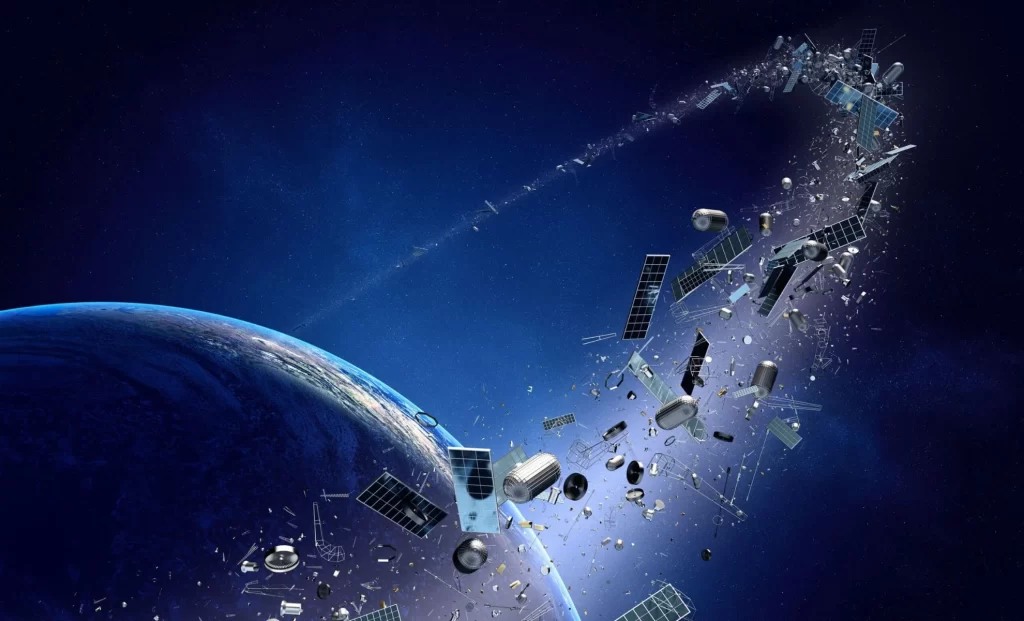Space Debris Management
News
As per ISRO, the upper stage of the PSLV C-37 mission has re-entered Earth’s atmosphere. The PSLV-C37 mission launched in 2017, with Cartosat-2D as the main payload along with another 103 satellites. It was the first mission to launch 104 satellites with a single vehicle. After injecting the satellites and passivation, the upper stage (PS4) was left in orbit. The re-entry is completely in accordance with the guidelines of the Inter-Agency Space Debris Coordination Committee.
Space debris includes defunct satellites, spent rocket stages, and debris fragments from collisions.
Concerns with Space Debris
- Source of marine pollution and a threat to marine life as 70 percent of Earth is ocean.
- Threat to human population and property.
- Kessler Syndrome: A chain reaction of collisions between debris and satellites leading to Earth’s orbit becoming unusable.
- Reducing space for new satellites and creating potential harm for operational satellites.
- More than 6,050 launches have resulted in 56,450 tracked objects in orbit, with 28,160 remaining in space as per the US Space Surveillance Network.
- Lack of coordination among nations and political tensions.
Initiatives
- Global: Inter-Agency Space Debris Coordination Committee, The Outer Space Treaty 1967, Rescue Agreement 1968, Committee on Peaceful Uses of Outer Space (UN Committee), Liability for Damage Caused by Space Objects 1972.
- India: Project NETRA, IS 4 OM of ISRO, Space Situational Awareness of ISRO.
Examples include ESA’s ClearSpace-1 mission, which will use a robotic arm to capture and dispose of a piece of space junk.
Inter-Agency Space Debris Coordination Committee
The international governmental forum facilitates the exchange of information on space debris research activities between member space agencies, facilitates opportunities for cooperation in space debris research, reviews the progress of ongoing cooperative activities, and identifies debris mitigation options.
Way Forward
- Improve coordination and communication between nations.
- Focus on better technology, increased funding, and more experts.
- Work on reusable rockets.
References



Thanks for sharing. I read many of your blog posts, cool, your blog is very good. https://www.binance.com/lv/register?ref=SMUBFN5I
Yo, seen anyone playing around on aagame777bet? Looks like they’ve got some interesting games. Thinking about throwing down a few bucks. Any tips or tricks from you seasoned players? Let me know! Give it a look: aagame777bet
Reading your article helped me a lot and I agree with you. But I still have some doubts, can you clarify for me? I’ll keep an eye out for your answers. https://www.binance.com/register?ref=IXBIAFVY
Thanks for sharing. I read many of your blog posts, cool, your blog is very good.
Your point of view caught my eye and was very interesting. Thanks. I have a question for you. https://www.binance.info/fr-AF/register?ref=JHQQKNKN
Thank you for your sharing. I am worried that I lack creative ideas. It is your article that makes me full of hope. Thank you. But, I have a question, can you help me?
I don’t think the title of your article matches the content lol. Just kidding, mainly because I had some doubts after reading the article.
Thank you for your sharing. I am worried that I lack creative ideas. It is your article that makes me full of hope. Thank you. But, I have a question, can you help me? https://www.binance.com/register?ref=IXBIAFVY
I don’t think the title of your article matches the content lol. Just kidding, mainly because I had some doubts after reading the article.
Your article helped me a lot, is there any more related content? Thanks!
Can you be more specific about the content of your article? After reading it, I still have some doubts. Hope you can help me.
Thank you for your sharing. I am worried that I lack creative ideas. It is your article that makes me full of hope. Thank you. But, I have a question, can you help me?
Your article helped me a lot, is there any more related content? Thanks! https://www.binance.info/register?ref=IHJUI7TF